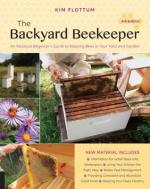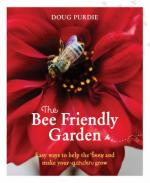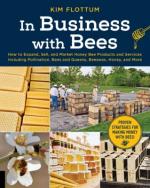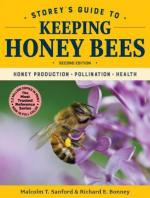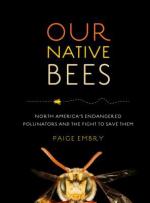August 1, 2019 | sobczakd
Honeybees are responsible for pollinating crops and producing honey that provide one third of the food we eat. National Honey Bee Day recognizes the contribution of honeybees and how much of a positive impact they have on our world. Honeybees are amazing. They can fly for miles, defend their hive against predators, and survive harsh weather conditions. But they are vulnerable to climate change. National Honey Bee Day aims to raise public awareness to not the flight of the bumble bee but their plight. Interested in bees or beekeeping? Here are some resources to inspire any bee enthusiast.
A Practical Guide to an Enjoyable HobbyBee keeping isn't just for the professional farmer--bees can be kept in any situation from simple backyards and rooftops to large expanses of farmland. Discover whether honey beekeeping is right for you, and find out everything you need to know to keep and acquire bees in this updated guide. Honey Bee Hobbyist, 2nd Edition will help novice beekeepers fully understand this exciting pastime. Dr. Norman Gary, a world-renowned honey bee expert and enthusiast, counsels beginners on all things honeybee related. He takes readers from finding bees and housing them to collecting honey and using their produce for pleasure and possible profit. With more than 100 fascinating color photographs and tips and tricks acquired over half a century of beekeeping, this practical handbook is your first step toward a wonderful and rewarding lifelong hobby.Honey Bee Hobbyist, 2nd Edition will show you how to: Start your own hive; Understand the life and times of honey bees; Care for your bees in each season and at every stage of life; Expand your apiary; Keep your neighbors happy; Educate others about bees; Get the most out of your new hobby.
More than a guide to beekeeping, this handbook features expert advice for:
- Setting up and caring for your own colonies
- Selecting the best location to place your new bee colonies for their safety and yours
- The most practical and nontoxic ways to care for your bees
- Swarm control
- Using top bar hives
- Harvesting the products of a beehive and collecting and using honey
- Bee problems and treatments
What's New in the guide? Information for urban bees and beekeepers such as:
- Using your smoker the right way
- Better pest management
- Providing consistent and abundant good food
- Keeping your hives healthy
With this complete resource and the expert advice of Bee Culture editor Kim Flottum, your bees will be healthy, happy, and more productive.
The world wouldn't get very far without bees. This is your chance to help out these often misunderstood, docile, pollinators. The Bee Friendly Garden is a guide for all gardeners to encourage bees and other beneficial insects like Monarch butterflies to enjoy your green space.
This manual is full of ideas for gardens of all sizes, it includes a comprehensive plant guide to bee friendly plants, as well as companion planting advice and recommendations on natural pest control. Learn how bees forage, why your garden needs them, and implement simple changes anybody can make. Whether you only have space for a few pots of fresh thyme or rosemary in a window planter, or want to plant wide beds of flowers, you won't have to wonder which are the most beneficial to these hard working ladies.
This book takes serious beekeepers past the beginning stages and learning curves and offers practical, useful advice to move your passion into a part-time or full-time career with measurable results. This beekeeping business how-to guide offers all of the in-depth advice you need such as:
- Writing a business plan
- Finding the best sources for funding
- Determining what your facilities will be and how to acquire them
- Getting and installing the right equipment
- Cooperating with other local businesses
- Stocking inventory and managing warehouse space
- Finding customers
- Raising and selling queens, packages, and nucs
- Expanding pollination, including contracts to protect you
- Making and selling peripheral products from wax, propolis, and honey
- Organizing teaching, speaking, and planning events
- Hiring and managing your growing team
- Promoting your business
- Measuring your success
This book provides solutions for all your beekeeping business questions, from start to finish. With this knowledge, you can become as knowledgeable, confident, and successful in running a business as you are in beekeeping.
This trusted handbook is a must-have for novice and seasoned beekeepers alike. Now totally redesigned and featuring color photos and graphics, the second edition also includes up-to-date information on honey bee health. The go-to reference presents comprehensive yet accessible information on everything from planning hives and installing a colony to preventing disease and managing productive hives that will bear bountiful honey harvests year after year.
Honey bees get all the press, but the fascinating story of North America's native bees--an endangered species essential to our ecosystems and food supplies--is just as crucial. Through interviews with farmers, gardeners, scientists, and bee experts, Our Native Bees explores the importance of native bees and focuses on why they play a key role in gardening and agriculture. The people and stories are compelling: Paige Embry goes on a bee hunt with the world expert on the likely extinct Franklin's bumble bee, raises blue orchard bees in her refrigerator, and learns about an organization that turns the out-of-play areas in golf courses into pollinator habitats. Our Native Bees is a fascinating, must-read for fans of natural history and science and anyone curious about bees.
 The environment is important to Canton Public Library and the Canton community. Canton Green Resources include:
The environment is important to Canton Public Library and the Canton community. Canton Green Resources include:


